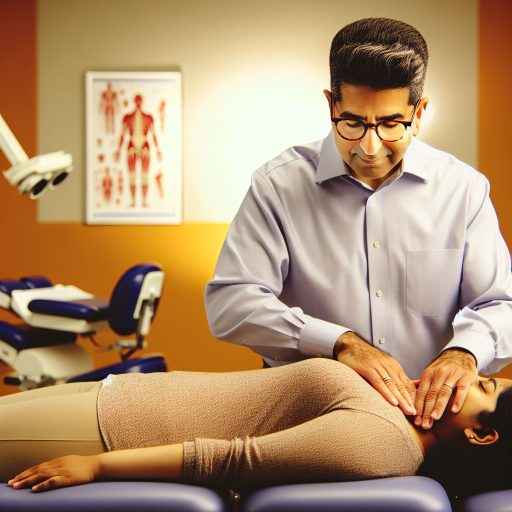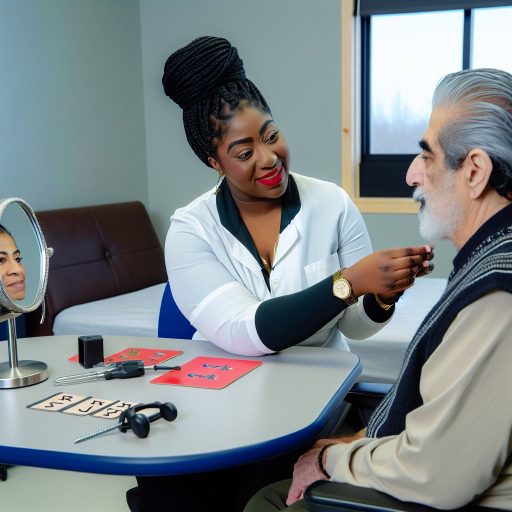Introduction to Kinesiology and its Relevance in Canada
Kinesiology is the scientific study of human movement.
It integrates anatomy, physiology, biomechanics, and motor learning.
This field focuses on promoting health and wellness through physical activity.
In Canada, kinesiology has grown significantly in popularity.
Many Canadians recognize the importance of physical health.
As a result, they seek professionals who can guide them.
Kinesiologists play a crucial role in health promotion.
They work in various sectors, including healthcare and fitness.
Furthermore, they contribute to rehabilitation programs.
This profession also supports improving athletic performance.
Moreover, kinesiology addresses issues related to chronic diseases.
It fosters active lifestyles within communities.
In schools, kinesiology promotes physical education programs.
Kinesiology graduates find opportunities in diverse settings.
They can work in hospitals, clinics, and corporate wellness programs.
Notably, their expertise is vital in sports organizations.
Consequently, kinesiology graduates are highly sought after.
The future of this profession looks promising in Canada.
Overall, kinesiology profoundly impacts individual and public health.
Overview of Kinesiology Degree Programs in Canadian Universities
Curriculum Focus
Kinesiology programs in Canada emphasize the study of human movement.
Students learn about biomechanics, anatomy, and physiology.
Moreover, they engage in practical and theoretical applications.
Hands-On Experience
Many universities require students to complete internships.
These internships provide real-world experiences in various settings.
Students often work in hospitals, sports clinics, and fitness centers.
Unlock Your Career Potential
Visualize a clear path to success with our tailored Career Consulting service. Personalized insights in just 1-3 days.
Get StartedResearch Opportunities
Research plays a vital role in kinesiology education.
Students may participate in research projects alongside faculty.
These projects often focus on health, rehabilitation, and performance.
Accreditation and Certification
Accredited programs ensure high-quality education standards.
Graduates may pursue certifications to enhance their credentials.
Common certifications include those from national governing bodies.
Career Preparation
Kinesiology programs prepare students for diverse careers.
Graduates may work in healthcare, fitness, or research.
Furthermore, they are equipped to pursue graduate studies.
Key Skills Developed Through Kinesiology Studies
Understanding Human Movement
Kinesiology graduates gain a deep understanding of human movement patterns.
This knowledge helps them analyze and improve athletic performance.
Additionally, they learn to identify movement dysfunctions and develop corrective strategies.
Exercise Prescription and Programming
Students learn to create tailored exercise programs for various populations.
This includes adapting exercises for individuals with injuries or chronic conditions.
Moreover, they acquire skills in designing programs for general fitness and rehabilitation.
Research and Analytical Skills
Kinesiology studies emphasize research methodologies and data analysis.
Graduates develop the ability to evaluate scientific literature critically.
They can apply research findings to practical settings, enhancing client outcomes.
Communication and Interpersonal Skills
Effective communication is a crucial skill for kinesiology professionals.
Graduates learn to convey complex ideas in simple terms.
Furthermore, they develop strong interpersonal skills through client interactions.
Leadership and Teamwork
Kinesiology programs foster leadership qualities amongst students.
They often participate in group projects that promote teamwork skills.
As a result, graduates are prepared to lead fitness classes or wellness programs.
Ethical and Professional Conduct
Ethics play a significant role in kinesiology education.
Students learn to recognize and address ethical dilemmas in practice.
This focus ensures they uphold professional standards in their careers.
See Related Content: How to Become a Licensed Kinesiologist in Canada
Career Opportunities for Kinesiology Graduates in Canada
Popular Career Paths
Kinesiology graduates can pursue diverse career paths in Canada.
The field offers exciting opportunities in health and fitness.
Moreover, graduates can find roles in rehabilitation and therapy.
Health and Fitness Careers
Many kinesiology graduates work as personal trainers.
They design customized fitness programs to meet individual needs.
Additionally, they may become fitness instructors in various settings.
This includes gyms, community centers, and wellness retreats.
Moreover, graduation can lead to work as exercise physiologists.
They help clients improve their physical fitness through tailored exercise regimens.
Rehabilitation Specialties
Kinesiology graduates also enter rehabilitation specialties.
They often find roles as athletic therapists.
These professionals support athletes recovering from injuries.
Furthermore, they can work as physiotherapy assistants.
In this capacity, they assist licensed physiotherapists in delivering care.
Additionally, some graduates pursue careers in occupational therapy.
They help individuals regain skills needed for daily living.
Research and Education
Another avenue for kinesiology graduates is research and education.
Some choose to teach physical education in schools.
Others focus on conducting research in exercise science.
Educational institutions value their expertise in human movement.
In fact, many kinesiology graduates work in university research labs.
This allows them to contribute to advancements in health and exercise.
Corporate Wellness Programs
Graduates can also participate in corporate wellness programs.
These initiatives promote healthy lifestyles among employees.
As wellness coordinators, they create programs to enhance employee health.
They often lead workshops on fitness, nutrition, and stress management.
Community Health Initiatives
Kinesiology graduates frequently engage in community health initiatives.
They might work with local organizations to promote physical activity.
Furthermore, they can develop public health campaigns targeting diverse populations.
These initiatives aim to combat obesity and enhance overall well-being.
Learn More: Key Dental Tools and Technologies Every Dentist Uses
Emerging Fields and Specializations within Kinesiology
Advancements in Sports Science
The field of sports science has expanded significantly in recent years.
Professionals in this area analyze athletic performance and training methods.
Moreover, they incorporate technology to enhance physical training strategies.
Colleges like the University of Alberta lead in these innovations.
Rehabilitation and Therapy Specializations
Kinesiologists are increasingly focusing on rehabilitation techniques.
They work closely with physiotherapists and occupational therapists.
This collaboration helps develop effective treatment plans for patients.
Organizations such as the Canadian Physiotherapy Association support these specialists.
Corporate Wellness Programs
Many companies are investing in corporate wellness initiatives.
These programs aim to improve employee health and productivity.
Kinesiologists develop tailored fitness programs for these workplaces.
Additionally, they conduct health assessments and fitness evaluations.
Community-Based Health Promotion
Community health promotion strategies are gaining traction.
Kinesiologists play a vital role in promoting active lifestyles.
They organize programs that encourage physical activity across all age groups.
Local health districts often partner with kinesiology graduates in this endeavor.
Technology and Kinesiology
Technology integration is transforming kinesiology practices.
Wearable devices and fitness apps track physical activity and health metrics.
Kinesiologists utilize this data to enhance training regimens.
Furthermore, they analyze trends to inform future fitness programs.
Gain More Insights: Steps To Becoming A Certified Audiologist
The Role of Kinesiologists in Healthcare and Rehabilitation
Introduction to Kinesiology
Kinesiologists play a vital role in the healthcare field.
Their focus is on improving physical mobility and overall health.
Working in Rehabilitation
In rehabilitation settings, kinesiologists assess patient needs.
They develop tailored exercise programs for recovery.
Moreover, they help patients manage pain and regain strength.
Collaboration with Other Healthcare Professionals
Kinesiologists often work alongside physiotherapists and doctors.
This collaboration enhances the quality of patient care.
They communicate effectively to ensure comprehensive treatment plans.
Providing Education and Support
Education is a significant part of a kinesiologist’s role.
They educate patients about injury prevention and health maintenance.
Additionally, they provide support for lifestyle changes.
Specialized Areas of Practice
Kinesiologists can specialize in numerous areas.
- Sports injuries
- Chronic pain management
- Performance enhancement
These specializations allow them to meet diverse client needs.
Impact on Community Health
Kinesiologists significantly contribute to community health initiatives.
They promote physical activity and healthy living.
Furthermore, they engage in public health campaigns.
Learn More: Benefits Of Pursuing A Career In Speech Pathology

Opportunities in Sports Management and Coaching
Career Paths in Sports Management
Kinesiology graduates often pursue careers in sports management.
This field includes roles like sports marketing and event planning.
Moreover, professionals can work with athletic organizations to enhance operations.
Sports management roles also focus on business aspects of sports teams.
Graduates can manage budgets, resources, and personnel effectively.
Coaching Opportunities
Many kinesiology graduates find fulfillment in coaching.
Coaching spans various age groups and skill levels.
This career allows professionals to nurture talent and develop athletes.
Coaches may work in schools, colleges, or professional sports teams.
They design training programs to optimize performance.
Skills Required for Success
Effective communication is essential in both sports management and coaching.
Leadership skills play a vital role in guiding teams.
Additionally, strategic thinking helps manage complex scenarios.
Analytical skills support data-driven decisions and performance evaluations.
Passion for sports fuels drive and motivation in these careers.
Networking and Professional Development
Networking opens doors to various career opportunities.
Professional associations provide valuable resources and connections.
Conferences offer platforms to meet industry leaders and peers.
Continuous education enhances skills and knowledge in the field.
Certification programs can improve job prospects and credibility.
Potential for Entrepreneurship in Fitness and Wellness Industries
Growing Demand for Fitness Services
The fitness industry continues to expand in Canada.
More people seek personal training and wellness coaching.
This trend creates numerous opportunities for entrepreneurs.
Starting a Fitness Business
Kinesiology graduates can establish personal training studios.
They can also open fitness boot camps in local parks.
Online training platforms are another viable option, especially post-pandemic.
Essential Steps for Starting a Fitness Business
- Conduct market research to identify target demographics.
- Develop a solid business plan outlining goals and finances.
- Secure necessary certifications to enhance credibility.
- Promote services through social media and local advertising.
Health and Wellness Coaching
Health coaching is another burgeoning field.
Kinesiology graduates can leverage their knowledge here.
Coaches help clients with nutrition and lifestyle choices.
Benefits of Health and Wellness Coaching
- Personalized programs can lead to significant client progress.
- Clients appreciate support in achieving their health goals.
- It fosters long-term relationships and repeat business.
Wellness Products and Services
Graduates can also consider wellness product development.
This includes creating fitness equipment or health supplements.
Starting a blog or YouTube channel can enhance their brand.
Building a Brand in the Wellness Space
- Engage with audiences through informative content.
- Collaborate with other health professionals for credibility.
- Utilize feedback to improve products and services.
Networking and Collaboration
Connecting with other industry professionals is crucial.
Attending fitness conferences provides learning and networking opportunities.
Building relationships can lead to partnerships and referrals.
Enhancing Your Business Network
- Join industry-specific associations to stay updated.
- Participate in local community events to build visibility.
- Engage in online forums focused on fitness and wellness.
Networking and Professional Associations in Kinesiology
The Value of Networking
Networking is crucial for kinesiology graduates in Canada.
It opens doors to various job opportunities and collaborations.
Building relationships can enhance career prospects significantly.
Moreover, effective networking can lead to mentorship opportunities.
Mentors provide guidance and support throughout your career journey.
Joining Professional Associations
Professional associations play an essential role in kinesiology.
They offer valuable resources and training for graduates.
Associations like the Canadian Kinesiology Alliance promote the profession.
Membership often includes access to job boards and industry news.
Additionally, networking events help members connect with employers.
Benefits of Networking Events
Networking events foster relationships with industry professionals.
These events provide insights into current trends in kinesiology.
Attending workshops can enhance your skills and knowledge base.
Furthermore, sharing experiences can inspire new ideas.
Utilizing Online Platforms
Online platforms facilitate connections among kinesiology professionals.
Social media can be a significant tool for networking.
LinkedIn helps showcase your qualifications and connects you with peers.
Additionally, online forums allow for discussions and sharing resources.
Continuous Professional Development
Engaging with professional associations supports lifelong learning.
Continuing education opportunities enhance your expertise.
Workshops and seminars improve your practical skills in the field.
Moreover, certifications can increase your employability in specialized areas.
Future Trends and Job Market Outlook for Kinesiology Graduates in Canada
Current State of the Job Market
The job market for kinesiology graduates in Canada is expanding.
Healthcare, sports, and rehabilitation sectors actively seek skilled professionals.
Moreover, many graduates find roles in academia and research.
Emerging Career Opportunities
New career paths in wellness coaching are gaining popularity.
Fitness technology also offers exciting prospects for kinesiology graduates.
Additionally, there is a growing need for specialists in injury prevention.
Impact of Health Trends
Current health trends significantly influence kinesiology career opportunities.
As Canadians prioritize health, demand for fitness professionals rises.
Furthermore, more organizations hire specialists to improve employee wellness.
Technological Advancements
Technology is transforming the field of kinesiology.
Wearable devices and fitness apps create new job roles.
Data analytics in sports performance is also emerging as a career focus.
Government Initiatives
Government initiatives promote physical activity across communities.
This support leads to more funding for kinesiology-related programs.
Furthermore, public health campaigns create additional job openings.
Additional Resources
Bachelor of Health and Physical Education — Athletic Therapy | MRU
What can you do with a Kinesiology degree? | Undergraduate …




